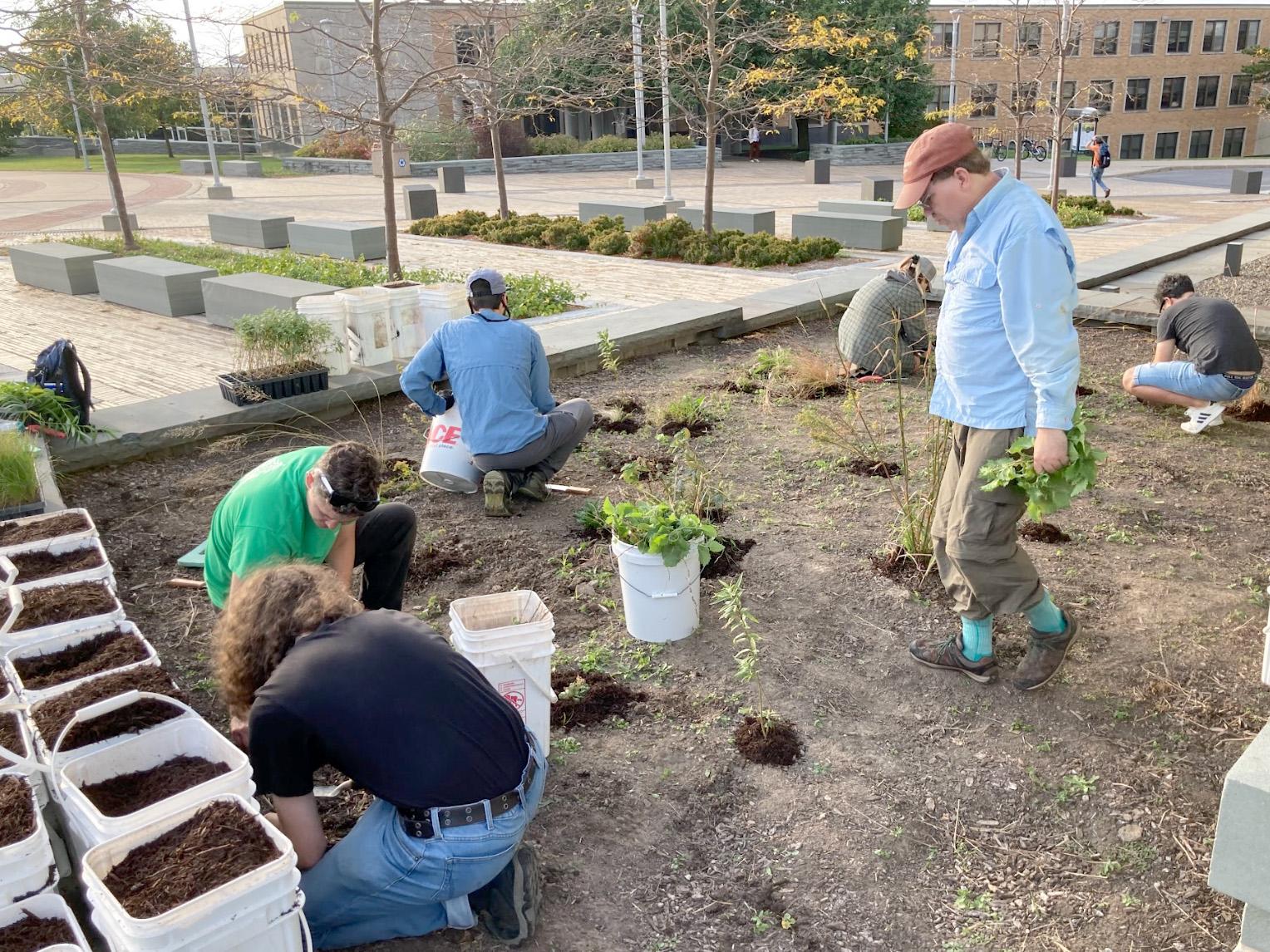Ongoing work and new initiatives -- like being named to the Arbor Day Foundation's Tree Campus Higher Education list and Bee Campus USA -- keep SUNY Oswego in Princeton Review’s "Guide to Green Colleges" for 2025. The Bee Campus USA designation recognizes campus efforts to protect pollinators, including planting supportive greenery in the university's Alvar Garden west of the Shineman Center.
SUNY Oswego’s range of sustainability activities once again earned recognition in Princeton Review’s "Guide to Green Colleges" for 2025, released in October.
Oswego is among 511 colleges in the U.S. and around the world to receive high rankings for exceptional programs, policies and practices related to sustainability and the environment.
“So many campus community members engage in and support so many projects large and small where we think about impacts that are short-term and long-term, local and global,” said Kate Spector, the university’s sustainability director. “This recognition is certainly icing on the cake, but putting in the work every day to make a difference is our primary focus.”
Earning a Gold Rating in 2023 AASHE STARS Report, a voluntary measure, was a major milestone that the university continues to build upon. Two recent designations – as a Tree Campus from the Arbor Day Foundation and as a Bee Campus USA – show how ongoing efforts are drawing recognition for the university’s dedication to environmental stewardship.
The Bee Campus USA designation in late October is designed to marshal the strengths of educational campuses for the benefit of the pollinators who play a crucial role in the food chain and overall ecosystem. The recognition notes the current work SUNY Oswego does and pledges to do to create a landscape in both Rice Creek Field Station and the lakeside campus to support the important work of pollinators.
Earlier this year, SUNY Oswego earned Tree Campus Higher Education recognition from the Arbor Day Foundation for commitment to effective urban forest management. SUNY Oswego regularly takes part in a number of events and activities, including Arbor Day plantings, programs and tree giveaways; a Maple Breakfast using sap harvested on campus; and raising awareness of the benefits of plentiful and well-maintained trees.
Sustainable initiatives
Another key ongoing campus project reflecting green goals involves Hewitt Hall renovations to convert it into a top national facility for the School of Communication, Media and the Arts, reopening in fall 2025. Designed to meet stringent Leadership in Environmental and Design (LEED) specifications, this high-profile work incorporated sustainability starting in the planning phase and included the installation of the second geothermal energy grid on campus, complementing the one that was part of developing the Shineman Center.
“Our ongoing commitment to adding geothermal wells as part of building renovations or construction has been a massive success,” Spector said. “We’re so happy that Hewitt’s return and the future renovations of Mahar Hall both include adding to a geothermal inventory that provides our residence halls with significant energy while driving down greenhouse gas emissions.”
SUNY Oswego has been in the vanguard of phasing out the use of single-use plastics, which the SUNY system announced as a policy this spring. The university’s Auxiliary Services has been proactive in eliminating and finding substitutions for these types of plastics.
“We’re very excited about this evolution and about the work we have put in already,” Spector noted. “Moving away from single-use plastics represents a major change that impacts our campus, our community and the world.”
In addition to a popular sustainability minor, SUNY Oswego is in the process of working toward a major in sustainability studies. The major would take the minor’s requirements in scientific principles, society and equity, and add humanities courses related to writing and storytelling, science communication and data-related skills. Expected graduates would build in-demand skills equipping them to work in the private or public sector in a growing field.
Other recent noteworthy accomplishments include:
- Continuing its award-winning Comp(Oz)t program, a partnership with Auxiliary Services that turns around 100,000 pounds of food waste annually into compost
- Diverting nearly 30,000 pounds of usable goods through the OzThrift program, where items left behind by students while moving out are repurposed into bargains for the campus and community
- An ongoing partnership with Auxiliary Services and a SUNY Oswego Native American studies course for its Maple on Tap project, which produces gallons of maple syrup while hosting an Earth Day Pancake Breakfast after harvesting a large quantity of sap
- The vibrant Permaculture Living Laboratory, a community garden space with a diverse array of fruits and vegetables
- Coordinating pickup of hundreds of pounds of litter through the Shining Waters Program
- Serving hundreds of students through a fleet of 100 bikes in the BikeShare program
About the Green Colleges guide
"We are seeing substantive interest among college applicants in attending green colleges,” said Rob Franek, editor-in-chief of the Princeton Review. Of the nearly 8,000 high school students who participated in the company's 2024 College Hopes & Worries Survey, 61 percent said having information about a college's commitment to the environment would affect their decision to apply to or attend the school.
“Since we created our Green Guide in 2010, we have also seen dramatic growth in the number of colleges committing to sustainability practices — from sourcing food locally and constructing LEED-certified buildings to making commitments to becoming fossil fuel-free,” Franek added. “We are proud to shine our light on these exceptional schools and to recommend them to students who want their ‘best-fit’ college to also be a green one.”
For more information or to check out the 2025 “Guide to Green Colleges,” visit www.princetonreview.com/green-guide.
SUNY Oswego also remains a mainstay in other Princeton Review guides, including its “2025 Best Regional Colleges” guide. Oswego has earned this designation every year since the educational services firm started regional listings in 2003.
For more information on SUNY Oswego’s green efforts, visit the Office of Sustainability website.




